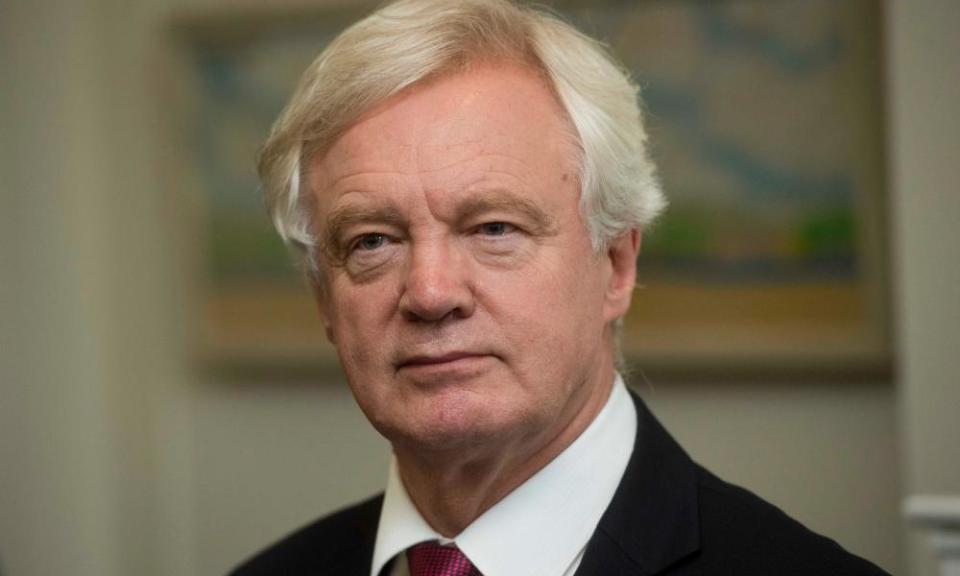David Davis seeks to close Brexit border rift with Ireland

David Davis has sought to close a potential Brexit rift with Ireland over his claim that the first-stage deal agreed last week was a statement of intent.
The Brexit secretary said his use of words on Sunday was meant to convey that the deal was stronger than merely being legally enforceable.
But in trying to calm down the issue on Monday, Davis risked fresh disagreement with the chancellor by saying Philip Hammond “mis-spoke” when he said the UK would have to pay a financial settlement to the EU even without a formal deal.
Davis prompted concern in Dublin and Brussels on Sunday when he appeared to suggest the initial deal was not legally binding.
EU citizens
EU citizens in the UK and UK citizens in the rest of the EU have the right to stay. Rights of their children and those of partners in existing “durable relationships” are also guaranteed.
UK courts will preside over enforcing rights over EU citizens in Britain but can refer unclear cases to the European court of justice for eight years after withdrawal.
Irish border
The agreement promises to ensure there will be no hard border and to uphold the Belfast agreement.
It makes clear the whole of the UK, including Northern Ireland, will be leaving the customs union.
It leaves unclear how an open border will be achieved but says in the absence of a later agreement, the UK will ensure “full alignment” with the rules of the customs union and single market that uphold the Good Friday agreement.
However, the concession secured by the DUP is that no new regulatory barriers will be allowed between Northern Ireland and the rest of the UK without the permission of Stormont in the interest of upholding the Good Friday agreement.
Money
There is no figure on how much the UK is expected to pay but the document sets out how the bill will be calculated – expected to be between £35bn and £39bn.
The UK agrees to continue to pay into the EU budget as normal in 2019 and 2020.
It also agrees to pay its liabilities such as pension contributions.
Other issues
The two sides agreed there would be need for cooperation on nuclear regulation and police and security issues.
There was an agreement to ensure continued availability of products on the market before withdrawal and to minimise disruption for businesses and consumers.
His comments followed those of Michael Gove, another leading Brexiter in the cabinet, who said voters could amend an EU withdrawal bill at the next election if they chose.
Joe McHugh, the Irish government’s chief whip, told the country’s RTÉ broadcaster on Sunday that Davis’s suggestion sounded bizarre. “This, as far as we’re concerned, is a binding agreement, an agreement in principle.”
Davis told LBC radio on Monday that his comments had been misunderstood. He said he had meant that the UK would avoid a hard border between Northern Ireland and Ireland even if a final deal did not happen.
“I said this was a statement of intent, which was much more than just legally enforceable,” he said. “Of course it’s legally enforceable under the withdrawal agreement, but even if that didn’t happen for some reason, if something went wrong, we would still be seeking to provide a frictionless, invisible border with Ireland.
“I was making the point it was much more than what’s just in the treaty, it’s what we want to do anyway.”
On the financial settlement, now estimated at up to £39bn – Davis said an initial suggestion had been nearer £100bn – he disputed Hammond’s suggestion that this was payable even without a deal.
Hammond told the Treasury select committee he found it “inconceivable that we as a nation would be walking away from an obligation that we recognised as an obligation”.
“That is not a credible scenario. That is not the kind of country we are. Frankly, it would not make us a credible partner for future international agreements.”
Asked if he agreed with the chancellor’s comments, Davis said: “I’m afraid the chancellor slightly mis-spoke.
“It says at the beginning of the thing, nothing is agreed until everything is agreed. It’s a classic European Union thing – they put it in every treaty. They put it there, not us.”
Asked how Hammond could get something so fundamental wrong, Davis said: “You’ll have to ask him. I don’t know what the context of the question was, I really don’t.”
Earlier on Monday, the Northern Ireland secretary, James Brokenshire, said Friday’s border deal was not legally binding but was a “solid commitment” by the UK to resolve the conundrum caused by Brexit.
He told RTÉ’s Morning Ireland that the same paragraph also stated that the “joint commitments set out below in this joint report shall be reflected in the withdrawal agreement in full detail” and this was a “firm commitment that we want to pursue”.
“I think this has given us a really solid way in which we can now approach the second phase of negotiations, with confidence,” he said. “I am sure that is a positive message that the PM will be giving in parliament today as she provides her update.”

 Yahoo News
Yahoo News 